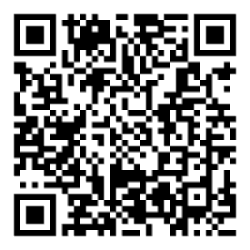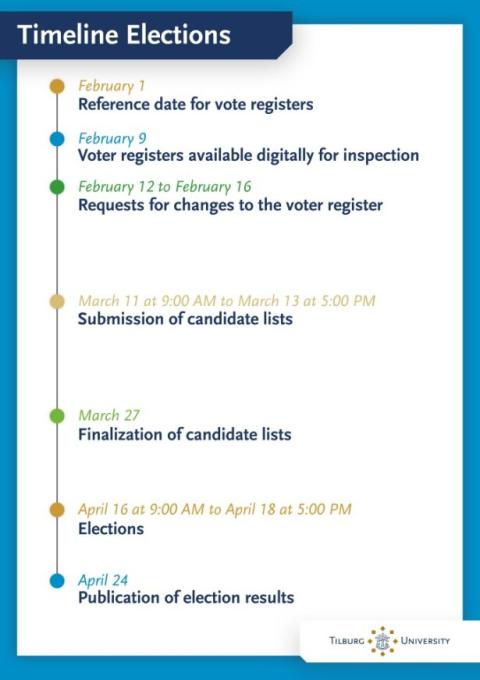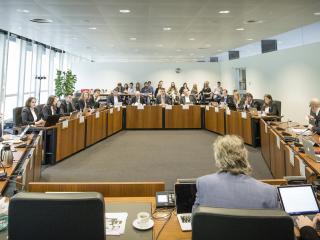2024 Elections for Participation
Every year elections take place for the representatives in the central and decentral Councils at Tilburg University. In 2024 the elections for students and employees will take place from April 16 till April 18.

Planning

12 to 16 February: request for change of the registration in the electoral register to the Electoral Committee (via stembureau@tilburguniversity.edu)
11 March (9:00 am) - 13 March ((5:00 pm)
Students and employees can stand for election digitally via: https://tilburguniversity.digitaleverkiezing.nl, login with Multi Factor Authentication (MFA)
27 March: announcement of the approved lists of candidates. Publication of the lists on the website.
16 April (9:00 am) - 18 April (5:00 pm)
Students and staff cast their votes digitally for the participation bodies via https://tilburguniversity.digitaleverkiezing.nl, log in via Multi Factor Authentication (MFA).
19 April (1:00 pm): announcement of the preliminary election results in a public session. Location: MKZ 1.
24 April: announcement of the results of the elections and online publication of the official report of the results.
You receive e-mails from digitaleverkiezing.nl on behalf of The Stembureau
Emails coming from external email addresses have been marked as “external” in Outlook since January ‘24. This is a security measure that helps you identify phishing, spam and other malicious emails from external senders. Note: the flagging does not mean it is a phishing or spam e-mail. It’s merely a quick way to see that the e-mail does not come from an internal source. In the coming period you will receive more emails from tilburguniversity@digitaleverkiezing.nl on behalf of The Stembureau. We want to emphasize that it is important to always check with a colleague, supervisor or IT support when in doubt about the authenticity of an e-mail.
Also interesting for you:
University Council
Student parties:
- SAM
- FRONT
- Novum (list of candidates)
- Tim Hopstaken
- Negin Mirzaghavam
- Kimberly Smits
- Behamin Akhbarinia
- Zehra-Hasret Karakilic
Other candidates:
- Khalid Berrouayel El-Jbary
- Ivana Pylypovová
- Nathalie Verschuur
- Coen Jonkman
- Ronja Dallner
- Toby Benavides
Faculty Council TiSEM
Student parties:
- ECCO
- Active TiSEM
- TEMPO (list of candidates)
Other candidates:
- Behamin Akhbarinia
- Ivana Pylypovová
- Toby Benavides
- Danish Samsudin
Faculty Council TSB
Student parties:
- Stimulus
- Active TSB
Other candidates:
- Maia Vukmir
- Tim Hopstaken
Faculty Council TLS
Student parties:
- Vrijspraak
- Active TLS
Other candidates:
- Kimberly Smits
- Zuzanna Maligłówka
- Jahnavi Tomar
- Emre Adivar
- Khalid Berrouayel El-Jbary
- Ronja Dallner
- Tina Silić
Faculty Council TSHD
Student parties:
- Active TSHD
Other candidates:
- Bashar Abdallah
- Coen Jonkman
- Nathalie Verschuur
- Wulan Bekker
- Zehra-Hasret Karakilic
Faculty Council TST
Student Perspective: no elections are required as there are more seats than candidates.
University Council
The University Council consists of nine employees and nine students from the university. They are elected through annual (students) or biennial (employees) elections among all students and staff. The council is a serious interlocutor of the board and formally influences the policy and the state of affairs within the university.
The council reviews proposed decisions of the Executive Board and brings issues from within the organization to the Board’s attention. Where necessary, the Council will use its rights to correct the Board’s proposals or issue proposals of its own. In this way, the University Council contributes to a healthy and balanced distribution of interests and influence within the university.
School (Faculty) Councils
The Faculty Council consists of employees and students from a School. The council represents the interests of students and employees in the field of education, research, policy and decision-making. To this end, it advises the Management Team, on request or otherwise, on matters and developments within the School. In addition, the council has the right of consent for matters such as the School’s regulations, part of the Education and Examination Regulations and the Strategic Plan. Each School at Tilburg University has its own Faculty Council.
Electoral Committee's Office
In accordance with article 3.1 of the Election regulations the Electoral committee consists of three to five members. The members and, if necessary, no more than three deputy members are appointed by the Executive Board of Tilburg University for a period of two years.
House rules promoting elections
Every employee and student of Tilburg University is entitled to participation. At our university, this is arranged both centrally (through the University Council) and decentrally (through the Faculty Councils and Service Councils).
The University Council and faculty councils consist of half staff members and half students; in service councils only staff members have a seat. During elections, there will be a modified promotion regulation under which promotion activities will take place. This regulation acts both as a supplement and a substitute for provisions in the house rules promotion activities.
Pursuant to Article 1 of the House Rules, the Executive Board (CvB) may issue binding instructions to anyone present on university grounds, in university buildings and/or using university facilities. In its meeting of February 26, 2008, the Executive Board adopted these instructions as implementing regulations of the House Rules.
1. Application range
These regulations apply to on-campus promotional activities during election campaigns for TiU's participation bodies. Campus refers to all TiU grounds and buildings including the Sports Center. In all cases, instructions from the Security must be followed.
2. Posters
General
a. Outside of the already assigned regular vertical lanes reserved for the political groups, posters may also be hung in other locations during the election campaign, as listed in 2b through 2i.
b. On all regular bulletin boards, not intended for student/student associations, where posters normally hang, one poster per political group may be hung.
2
c. It is not permitted to hang posters over posters of others. For regular bulletin boards, this expressly includes posters promoting activities other than elections.
d. The team leader of the Security Department is authorized to remove promotional material that does not comply with the rules or otherwise poses a security risk. If possible, the group involved will first be summoned to remove the material within one hour, after the discovery of the irregularity. For this purpose, the Security Department will contact the secretary of the polling station. The secretary will then promptly forward the report to the group involved.
e. In the event of a disagreement between student groups, the Chair of the Central Consultation of and for Students (COS) will first be asked for advice. If the disagreement persists then the secretary of the voting committee will decide.
f. Posters may be double-sided on the inside of a window. This includes attaching two posters on top of each other so that the information is visible both inside and outside.
g. Warande building
Paragraph 1
In the foyer of the Warande Building there are 3 windows near the entrance to be divided among the candidates for the University Council. Each group may put up a maximum of one vertical strip of posters in total on one of these windows. In case of disagreement, the secretary of the polling station will decide after hearing the president of the University Council.
Paragraph 2
The 3 windows in addition to the windows mentioned in paragraph 1 may be used by candidates for faculty councils. Each group may hang a maximum of one vertical strip of posters in total on one of these windows. In case of disagreement, the secretary of the voting committee shall decide after hearing the president of the University Council.
h. Dante Building
Paragraph 1
In the foyer of the Dante Building there are 3 windows near the entrance to be divided among the candidates for University Council. Each group may put up a maximum of one vertical strip of posters in total on one of these windows. In case of disagreement, the secretary of the polling station will decide after hearing the president of the University Council.
3
Paragraph 2
The 3 windows in addition to those mentioned in paragraph 1, may be used by candidates for faculty councils. Each group may hang a maximum of one vertical strip of posters in total on one of these windows. In case of disagreement, the secretary of the polling station shall decide after hearing the president of the University Council.
i. Montesquieu Building
In the Montesquieu Building, the first four windows from the main entrance are to be divided among candidates for the University Council and Faculty Councils. Each group may put up a total of a maximum of one vertical strip of posters on one of these windows. In case of disagreement, the secretary of the polling station will decide after hearing the president of the University Council.
3. Campaign facilities
Candidates are basically responsible for reserving and using facilities to support their campaign. In addition, some facilities are offered to political groups through the secretary of the polling station. The facilities are paid from the general election budget.
a. Stands
Paragraph 1
A number of market stalls/stands will be reserved by the secretary of the polling station. The polling station will ask participating groups if they need a booth. The booth will be available throughout the election period, excluding weekends.
Paragraph 2
Political groups participating in the University Council election are entitled to their own booth.
Paragraph 3
One booth may be reserved per faculty which groups participating in the Faculty Council election may rent by mutual agreement.
Paragraph 4
Fractions may decorate their own booth in any way they see fit, as long as the result is safe, the booth is not damaged and no balloons filled other than with air are used.
Paragraph 5
The two permanent stands (in the Esplanade), the tables in the various coffee rooms (including Cobbenhagen Building and Prisma Building) and Food Plaza are available.
4
regular (other) promotional activities. These booths will not be used for election activities.
b. Banners
The maximum number of banners that may be hung on the UvT grounds will be increased from 2 to 6 during the elections. This is subject to a maximum of 1 per association. Political groups wishing to hang a banner must take care of creating the banner, obtaining permission and reserving a spot via the DFB service desk. Hanging spots will not be reserved exclusively for elections. Banners may only be hung between the trees on the lawn in front of the Koopmans Building.
4. Campaign Activities
Paragraph 1
During the election period, the possibilities for conducting promotional activities have been broadened. Campaign activities may take place on the entire UvT grounds, with the exception of the following actions/locations:
- It is not permitted to hand out promotional materials in (class) rooms/colleges unless the group has reserved this location for this purpose itself.
- In all cases, it is not permitted to conduct promotional activities in the library. This includes the entire walkway with stairs.
- Promotional activities in the Montesquieu Learning Centre (MLC) and the Goossens Learning Centre are not permitted.
Paragraph 2
A group requires prior permission from the secretary of the voting committee in consultation with the president of the University Council for an activity if it takes place at any of the following locations:
- Koopmans Building
- All dining facilities
- The entrance to the Esplanade
- Cobbenhagen building
- Goossens building (except the Learning Centre)
Paragraph 3
A number of restrictions (from the house rules promotional activities) on handing out promotional materials expire during the elections for the participants in these elections, namely:
- Handing out newspapers and magazines will be allowed.
5
- Candidates who want to hand out something from the booth no longer need to indicate in advance what they will hand out.
- It is permitted to hand out food and drinks. The catering and health laws must be complied with.
Under no circumstances may the following products be handed out.
- Stimulants and narcotics (tobacco, alcohol, drugs)
- Chewing gum
- Commercial leaflets
- Balloons filled with anything other than air.
5. Cleanup and sanctions
Paragraph 1
Candidates are responsible for removing campaign materials themselves. Regular instructions apply to stands and banners.
Paragraph 2
Election posters and flyers placed in racks must be removed no later than 11 p.m. on the first business day after the unofficial results are announced.
Paragraph 3
Flyers, leaflets, etc. left outside designated areas on university grounds must be removed by 11 p.m. daily.
Paragraph 4
Should DFB itself have to remove these materials after this period, the bill will be sent to the polling place. If a group is demonstrably responsible for the costs incurred, these costs, through the election budget, will be recovered from the group in question. If it is not possible to identify the group responsible, the bill will be paid from the general election budget, so that the burden is shared equally among all parties.
6. SPAM
No general student and/or employee address lists may be used for promotional purposes, nor may private data be used improperly for the purpose of elections. No exception will be made for elections. However, it is permitted to send campaign e-mail to e-mail addresses that a group itself already has.
6
7. Not provided
Where no rule is not provided, the decision will be made by the secretary of the Voting Committee.

